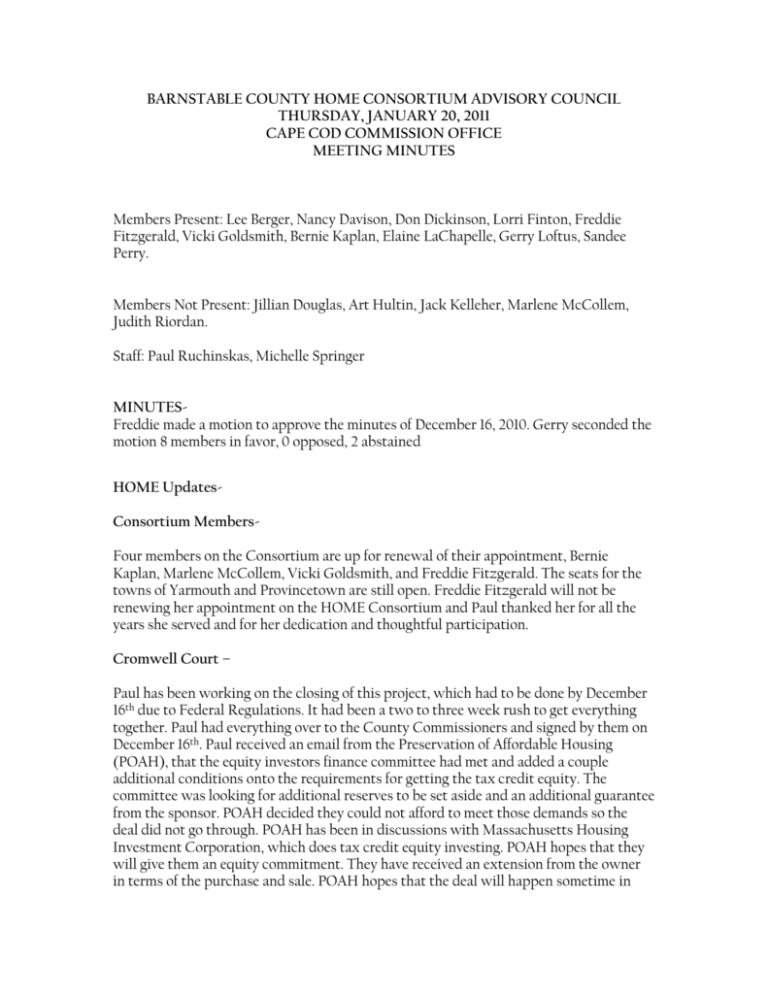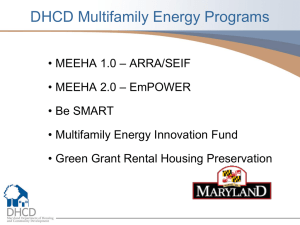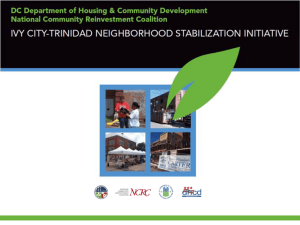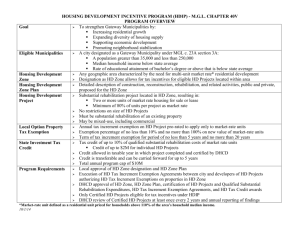barnstable county home consortium advisory council
advertisement

BARNSTABLE COUNTY HOME CONSORTIUM ADVISORY COUNCIL THURSDAY, JANUARY 20, 2011 CAPE COD COMMISSION OFFICE MEETING MINUTES Members Present: Lee Berger, Nancy Davison, Don Dickinson, Lorri Finton, Freddie Fitzgerald, Vicki Goldsmith, Bernie Kaplan, Elaine LaChapelle, Gerry Loftus, Sandee Perry. Members Not Present: Jillian Douglas, Art Hultin, Jack Kelleher, Marlene McCollem, Judith Riordan. Staff: Paul Ruchinskas, Michelle Springer MINUTESFreddie made a motion to approve the minutes of December 16, 2010. Gerry seconded the motion 8 members in favor, 0 opposed, 2 abstained HOME UpdatesConsortium MembersFour members on the Consortium are up for renewal of their appointment, Bernie Kaplan, Marlene McCollem, Vicki Goldsmith, and Freddie Fitzgerald. The seats for the towns of Yarmouth and Provincetown are still open. Freddie Fitzgerald will not be renewing her appointment on the HOME Consortium and Paul thanked her for all the years she served and for her dedication and thoughtful participation. Cromwell Court – Paul has been working on the closing of this project, which had to be done by December 16th due to Federal Regulations. It had been a two to three week rush to get everything together. Paul had everything over to the County Commissioners and signed by them on December 16th. Paul received an email from the Preservation of Affordable Housing (POAH), that the equity investors finance committee had met and added a couple additional conditions onto the requirements for getting the tax credit equity. The committee was looking for additional reserves to be set aside and an additional guarantee from the sponsor. POAH decided they could not afford to meet those demands so the deal did not go through. POAH has been in discussions with Massachusetts Housing Investment Corporation, which does tax credit equity investing. POAH hopes that they will give them an equity commitment. They have received an extension from the owner in terms of the purchase and sale. POAH hopes that the deal will happen sometime in mid March. This is the first time something like this has happened on a project with our funding. In terms of preservation projects, Swan Pond Village, which is 150 units in Yarmouth, had their mortgage up last fall and the owners could have converted to market housing. There were no affordability restrictions or comp permits involved. They ended up selling it to a group called Western Associates out of Boston who has renewed the Section 8 contract for another ten years, which preserves the 150 units. HOME/UDR updatePaul explained that there is nothing to report at this time on the HOME/UDR. DHCD is supposed to be meeting soon to discuss the proposal. Paul mentioned that the Orleans Selectman would be discussing the transfer of the award from John McShane to HECH for the Hinckley project. Freddie responded that the Selectman had not yet discussed the transfer and it was not on the agenda. Project Scoring System changesThe last changes to the scoring system were made in August for the September funding round. LEED was set aside and the Energy Star was left as is. There are three issues that need discussion: the first is the scoring on the Energy Star portion of the scoring system. The requirements for Energy Star are constantly changing, nationally along with local building codes here in MA. In terms of the MA building code, with the 2009 International Energy Conservation Code that was put into place, in most cases if you build to code it will result in a home that is 15% more efficient than before, but not a guarantee. Energy Star nationally is taking a little different path, which is leaning more towards the LEED perspective. Mass. Energy Star is going to focus on strictly energy efficiency. For the 2011 program, there will be three levels of energy efficiency that can be achieved. It will depend on the amount of bedrooms and size of the home. The first tier is 15% improvement or better, the second tier would be 30% improvement or better and the third tier being 45% improvement or better. Paul spoke with Bruce Torrey about the new stretch building code that has been adopted by a couple towns on the Cape. The stretch code is a locally adopted building code that promotes additional energy efficiency. Paul recommends a target of energy star criteria that requires a tier two rating in order to get the ten points. Bruce noted that raters could typically look at plans and specs and be able to give an estimate score. Projects would have to get a rater to look at plans and specs and give them an estimate score rating to include in their application for funding. Paul is going to check with Margaret Song and Bruce to confirm that a rater can confirm which tier the project will reach. Nancy noted that she thinks it should be clear as to what will be required by developers to reach these tiers so that everyone is on a level playing field. Vicki asked if the final payment would be held back until the project is tested and meets the tier requirements previously stated in the application? Paul responded that the only time he would do that would be is if the 10 additional points put the score above 90. Otherwise, it would not make a difference in the funding amount they would receive. If the project was over the 90 points and did not prove to be at the tier previously stated, the project would not get the additional funding. Energy Star will reimburse up to $700 for the cost of hiring a rater to look at the project. You also get $750 per unit in order to get the incentive payments from Mass. Energy Star, but you need to use a certified rater. If the project gets to tier two, the project will get $1250 from Energy Star and extra $5,000 per unit from us, it should pay the additional cost of hiring a rater. Nancy asked if you need to be a HERS rater in order to evaluate Energy Star? Paul said he believed that yes you do need to be a HERS rater, but he will check. Vicki said that she would be in favor of the points change to tier two for energy efficiency. She does oppose having additional points for LEED certification. She feels that 5 points for using a developer that has done LEED project prior because that means that they would have experience in LEED that could be used. She does not think it is right to ask the affordable developers to take on the additional expense of hiring a rater. Vicki went on to say that she thinks it would be a better system to have separate scoring tracks for rental vs. homeownership. A future possibility would be to set a target for HOME funds over a three-year period, a certain percent reserved for rental and a reserve for home ownership. There are some points that do not make sense for homeownership projects. The Consortium members continued to discuss the different parts of the scoring system and the LEED process. Lee moved to amend and incorporate all three recommendations, Gerry seconded the motion 4 members in favor, 6 opposed, 0 abstained. Vicki moved to make the changes to Energy Star tier two not the LEED adoption, Bernie seconded the motion 9 members in favor, 1 opposed, 0 abstained. Funding RoundDHCD has not yet made their funding award announcements from September. Paul hopes to hear something in the next couple of weeks. The next DHCD round should be sometime in March. Unless all five Cape projects are funded, we will need to have another funding round. Paul thinks it is possible that 1 or 2 projects from the Cape will be funded. HAC will be coming back for their Community Green project and possibly BHA’s Stage Coach Road project. Paul recommends scheduling our next funding round depending on when DHCD set theirs, and it would be for rental only, unless the HOME deed rider issue is settled with DHCD. The proposal Paul has given to DHCD would only cover our homeownership projects that are in process right now. Paul also noted that we submitted an application back in the beginning of December for HUD’s Fair Housing education and outreach grant for $124,536. It went in on behalf of the County through the Commission, the HOME Consortium and Barnstable County Human Services Dept. Paul hopes to hear something by March. Nancy asked if we get the funding would we be issuing a RFP? Paul answered that yes, we would be issuing a RFP and hiring a consultant would be doing a lot of the education and the outreach. Federal and State PolicyThere was no funding in any of the December legislation for the National Affordable Housing Trust. HUD is going along and getting comments on the regulations. There will be a National Housing Trust in place with adopted regulations, but with no funding. The Federal budget is still up in the air as far as HOME allocations are concerned. Paul hopes to hear something by early March. DHCD 2011 draft Annual PlanDHCD has released the draft 2011 Annual Plan. DHCD will not be providing any funding for new homeownership developments. All the project funding will go to rental housing. As far as CDBG funding there is no housing development support program. Paul would like to provide a comment letter to DHCD and encourage them to provide some funding for housing authorities for small scale rental developments. There is a big gap for that in DHCD’s plan. DHCD has draft deed restrictions that hopefully deals with the HOME issues but has not yet been released. DHCD has two different recapture models, one is for communities that are struggling and are trying to get people to buy homes in their community. DHCD will provide the funding and they can sell the home to anyone they want, but they will have to pay DHCD back. The other recapture model is for “opportunity” communities with the expectation that homes prices will go up. The recapture model there will be the shared appreciation, which means there will be a certain percentage for the homeowner to keep and a certain amount goes back to DHCD. DHCD also hired a consultant to do a study on local preference but DHCD is not ready to release it as of yet. The Annual Plan did state that minority participation is strong overall. Federal Home Loan Bank of BostonPaul included a handout of information for the Consortium members. Other BusinessPaul went to a CHAPA workshop on state aided public housing. Everyone on the panel complimented DHCD’s public housing people for working in the spirit of more cooperation with local housing authorities, tenants etc. DHCD will be issuing an RFP for regional service agencies. The idea is to have a lead agency and then have other smaller housing authorities agree to partner and the lead agency will provide certain services. Sandee noted it is a good thought but comes with many issues to be worked out. One of the questions is will it save money in the end? There are many agencies looking at it. There has been discussion at the housing authority’s directors meetings that she attends. It will be more difficult on the Cape do to with the housing agencies being so far apart from each other. An area like the South Shore there are bigger agencies that could probably assist smaller agencies that are in close proximity. Paul spoke about a new CPA legislation, which is the Act to Sustain Community Preservation. It got through the joint committee on community development, which is father than it has ever gotten. There are three components of the bill, the first being the annual minimum CPA funds distribution to a 75% match. The second will broaden the CPA participation in cities that are less affluent, many of which have yet to adopt CPA. Third would clarify the allowable uses for CPA funds so that communities can rehabilitate existing outdoor parks and other recreational resources. Paul asked the Consortium members if they felt comfortable supporting the legislation. Nancy made a motion for the Consortium to support the legislation, Freddie seconded the motion, 10 members in favor, 0 opposed, 0 abstained Meeting adjourned 9:55am






